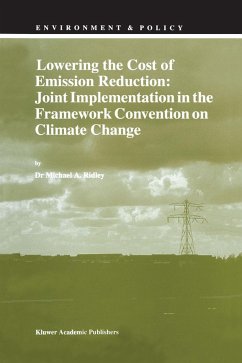
Both Sides of the Border
Transboundary Environmental Management Issues Facing Mexico and the United States
Herausgegeben: Fernandez, Linda; Carson, Richard T.

PAYBACK Punkte
77 °P sammeln!
The Mexican -- United States border represents much more than the meeting place of two nations. Our border communities are often a line of first defense -- absorbing the complex economic, environmental and social impacts of globalization that ripple through the region. In many ways, our success or failure in finding solutions for the environmental, social and economic issues that plague the region may well define our ability to meet similar challenges thousands of miles from the border zone. Border residents face the environmental security concerns posed by water scarcity and transboundary air...
The Mexican -- United States border represents much more than the meeting place of two nations. Our border communities are often a line of first defense -- absorbing the complex economic, environmental and social impacts of globalization that ripple through the region. In many ways, our success or failure in finding solutions for the environmental, social and economic issues that plague the region may well define our ability to meet similar challenges thousands of miles from the border zone. Border residents face the environmental security concerns posed by water scarcity and transboundary air pollution; the planning and infrastructure needs of an exploding population; the debilitating effects of inadequate sanitary and health facilities; and the crippling cycle of widespread poverty. Yet, with its manifold problems, the border area remains an area of great dynamism and hope -- a multicultural laboratory of experimentation and grass-roots problem-solving. Indeed, as North Americamoves towards a more integrated economy, citizen action at the local level is pushing governments to adapt to the driving forces in the border area by creating new institutional arrangements and improving old ones. If there is one defining feature of this ground-up push for more responsive transboundary policies and institutions, it is a departure from the closed, formalistic models of the past to a more open, transparent and participatory model of international interaction.














